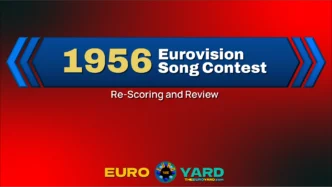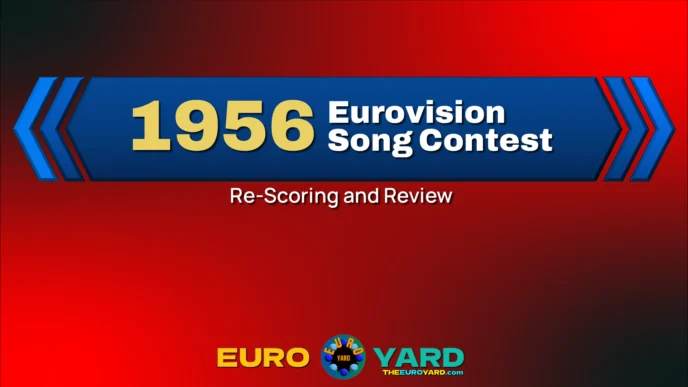Please Note: This article is obsolete as of March 2025. A new scoring rubric has been released and it can be found here.
My largest project associated with watching the full history of Eurovision was rating every Eurovision Song Contest performance, and then ranking them.
Because the list may soon need to be updated, Euro Yard will do the big reveal of our Top 100 beginning in the second half of 2024. Prior to sharing some of those results with the greater Euro public, I wanted to take some time to explain how I went about it.
While you wait, you can watch the rankings of each contest unfold on our Eurovision Rankings page.
Creating a Rubric
While evaluating the songs and devising my own rubric, I used the same four criteria which the European Broadcasting Union asks its national juries upon which to focus:
- Overall impression
- Vocal capacity of the artist(s)
- Composition and originality of the song
- Staging performance
Source: Eurovision Song Contest Wiki | National Jury | Rules of the Voting Jury
I also added a column on my scoresheet for bonuses or penalties, not to exceed 10 points in either direction (which could account for a swing of two percent). This is not going to mean a difference between winning or losing for the vast majority of songs, but could mean the difference between, say, ninth and tenth place. For examples of this: When you get to Norway’s song in 1984, I took a two-point penalty because of the ridiculous, loud shriek at the beginning of the song, and in 1977, I gave Switzerland a bonus point for using an alphorn in their song. All this does is account for minor details for which the four main categories may not consider.
Weighing the Categories
Next, I had to consider how to weigh these categories. I decided that overall impression of the song had to be paramount, but I also considered that I regard vocals as being very important to me. This was my second-heaviest weight. I go into these performances wanting to be wowed, and while there are recent examples of over-the-top staging and personality overwhelming the other factors (looking at you, Käärijä), generally speaking, the songs I felt had great vocals tended to rise far up the list. Of course, in such a massive contest, there are exceptions to that conventional wisdom as well: for example, I do not think anyone will accuse “A Man Without Love” (United Kingdom, 1966) as being an all-time great song despite having what was probably one of the better overall vocal performances. That just shows that no one factor is determinative in how “good” a song is.
Composition and staging came third and fourth, respectively. In the early years of Eurovision, staging was a minor consideration, so unless there was any flair whatsoever, most songs in the first two or three decades of the contest got a base score of 50 percent (30 points) for staging. It would not be until much later that I observed staging starting to significantly help or hurt a majority of acts, but it was a factor for some acts in the earlier days.
Devising a Scoring System
As of mid-2024, I have watched the contests through four times on different occasions. Yes, that’s a lot, because there are at present 1,721 songs. Of the four categories, they were also broken into sub-groups. This is how it looks:
CATEGORY 1: GENERAL (40% of score)
- Overall quality and impression of the song (150 points, or 30% of total)
- Engagement factor, or how interesting or dull a song was (50 points, or 10% of total)
CATEGORY 2: VOCAL CAPACITY (28% of score)
- How good the artist(s) sounded on stage (70 points, or 14% of total)
- Vocal range, variety, and variation of notes hit (70 points, or 14% of total)
CATEGORY 3: COMPOSITION (20% of score)
- Originality, uniqueness, and quality of the sound (50 points, or 10% of total)
- Quality of the lyrics (50 points, or 10% of total)
CATEGORY 4: STAGING (12% of score)
- Stage design and visual appeal of performance (40 points, or 8% of total)
- Whether the staging elements fit or made sense in the context of the song (20 points, or 4% of total)
BONUSES OR PENALTIES (±10 points)
- Maximum score cannot exceed 500 or go below zero
TOTAL POINTS: 500
An average song, therefore, would get a score of about 250. Spoiler: No song got 500 points, or even close to it. I regard 500 points as a level of perfection that may or may not be attainable by a living human. 450 is probably not even achievable in any sense I could tangibly measure. Even if it existed, such a song may be beyond my febrile comprehension.
Likewise, zero points is an accomplishment of catastrophic failure which may be equally impossible to reach; even the worst song on the planet by a semi-competent singer could scrounge together 100 points just by showing up for the contest and uttering literally anything. I could manage 75 to 100 points under this scoring system and I haven’t sung on stage since high school chorus. Almost every song will fall between 100 and 400 points.
And Then, The Rankings
Finally, it came time to rank the songs by year and then overall. One might imagine that with that many songs, there would be many ties to break. I used the categories from #1 through #4 as the primary tiebreakers, in that order. If songs were still tied after that, they were ranked on straight-up judgment calls. The more songs I added to the list, the less that mattered. Nobody is going to care if a song is ranked 851st or 852nd; I certainly don’t. Tiebreakers made a much more notable difference on a year-by-year level; some songs finished inside or outside my top ten because of them, and in a few rare cases, the top songs tied.
With this insight in hand, soon comes the time for me to get into some of my favorite Eurovision songs – and the worst. Stay tuned in the second half of 2024.













